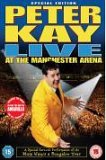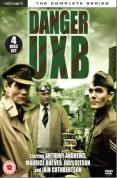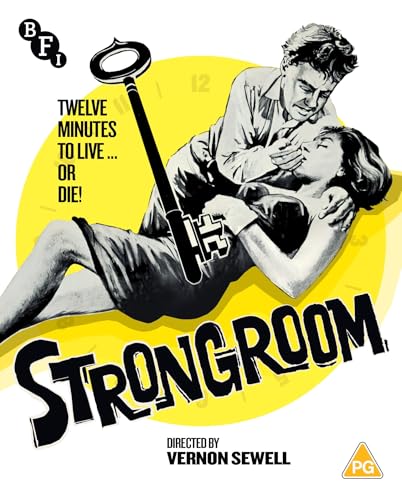![The Prisoner: The Complete Series [DVD]](/pictures/1151071.jpg) The Prisoner: The Complete Series | DVD | (17/02/2020)
from £41.98
| Saving you £N/A (N/A%)
| RRP
The Prisoner: The Complete Series | DVD | (17/02/2020)
from £41.98
| Saving you £N/A (N/A%)
| RRP Five decades on from its first UK broadcast, The Prisoner remains as fresh and dynamic as when it was first unleashed upon an unsuspecting world in 1967. This set presents the complete series, stunningly restored, together with a wealth of special features. THE SERIES All 17 episodes, presented with text commentaries on each episode, detailing the production history. IN MY MIND A feature length documentary in which director Chris Rodley recalls his 1983 efforts to interview Patrick McGoohan for a Channel 4 documentary. The film features interviews with Catherine McGoohan, rare archive footage and never-before-seen interview sessions with McGoohan himself. MANY HAPPY RETURNS A short revisiting the original locations used in the Prisoner. FILMING ARRIVAL Recently-discovered home movie footage of the filming of Arrival. THE PRISONER PUZZLE In a rare appearance to talk about the series, Patrick McGoohan is interviewed by Warner Troyer in an exclusive programme for TV-Ontario from 1977. STILLS GALLERIES Featuring rare and never-before-seen photographs from official and personal archives. CATHERINE McGOOHAN Reflects on her father s work and legacy. PORTMEIRION 1939 Recently-discovered 16mm Kodachrome amateur footage of Portmeirion showing the early days of its development circa 1939. PATHE NEWS: BEAUTY AND THE BEAST Pathe News' initial visit to Portmeirion in 1939 presents the first opportunity to give the village mass exposure via Britain's cinema screens. PATHE NEWS: ITALY IN WALES Pathe News returns to Portmeirion in 1962, this time in Technicolor. LESLIE GILLIAT RECCE 35MM TRANSPARENCIES Producer Leslie Gilliat was assigned to The Prisoner in the early stages of the project and visited Portmeirion in 1966 to photograph the village. These 35mm transparencies are the results of that recce and present some initial ideas for the buildings' use in the series. TRIMS A selection of trims from Arrival, Many Happy Returns, The Chimes of Big Ben and The Girl Who Was Death. RADIO ON Radio 1 DJ Simon Bates was given a rare opportunity to interview Patrick McGoohan when he visited the NEC in Birmingham to be presented with a Caterham Super 7. PATRICK MCGOOHAN 1983 An outtake from one of Chris Rodley's full interview sessions with Patrick McGoohan for the original Six Into One The Prisoner File documentary.
 Peter Kay - Live At Manchester Arena | DVD | (14/11/2005)
from £4.98
| Saving you £17.01 (341.57%)
| RRP
Peter Kay - Live At Manchester Arena | DVD | (14/11/2005)
from £4.98
| Saving you £17.01 (341.57%)
| RRP Peter Kay is back with this DVD featuring his final performance at the Manchester Arena to a 9 000 sell out crowd on the 'Mum Wants A Bungalow Tour'. Also included on the DVD is a previously unseen and exclusive 47-minute documentary - 'One Hundred And Eighty - The Tour Documentary' a hilarious fly on the wall look at life backstage for Peter Kay as he travels around the UK on his jam-packed stand-up tour. Furthermore the DVD incorporates the chart topping video and the biggest se
 The Great Outdoors | DVD | (10/11/2003)
from £8.65
| Saving you £1.34 (15.49%)
| RRP
The Great Outdoors | DVD | (10/11/2003)
from £8.65
| Saving you £1.34 (15.49%)
| RRP When an unannounced uninvited and unwelcome family of fun-loving misfits converge upon a lakeside resort to join their relatives for a summer of relaxation the result is anything but restful. It's a vacationer's worst nightmare as wheeler-dealer Aykroyd his sexually repressed wife and eerie twin daughters 'join' the easygoing Candy and his straight-laced clan for a season of 'fun' in the sun. Unfortunately the only thing these two in-laws have in common is their intense dislike for each other. Soon it's brother-in-law against brother-in-law in an uproarious and hilarious fight to the finish to see which one really knows how to enjoy 'The Great Outdoors'.
 Danger UXB | DVD | (19/06/2006)
from £N/A
| Saving you £N/A (N/A%)
| RRP
Danger UXB | DVD | (19/06/2006)
from £N/A
| Saving you £N/A (N/A%)
| RRP Anthony Andrews plays a young Lt. in the early days of World War II who is assigned to a UXB unit. UXB is the signal that an aerial bomb has not exploded. Andrews' job is to deactivate bombs made by German technicians some of which have fuses specifically designed to kill him. The series takes us through his maturation as an officer a love story with Judy Geeson and the stresses and strains of wartime on the civilians and military in England. Episodes Comprise: 1. Dead Ma
![Bullitt [1968]](/pictures/1005089.jpg) Bullitt | DVD | (17/04/2019)
from £8.52
| Saving you £10.23 (151.33%)
| RRP
Bullitt | DVD | (17/04/2019)
from £8.52
| Saving you £10.23 (151.33%)
| RRP San Francisco has been the setting of a lot of exciting movie car chases over the years, but this 1968 police thriller is still the one to beat when it comes to high-octane action on the steep hills of the city by the Bay. The outstanding car chase earned an Oscar for best editing, but the rest of the movie is pretty good, too. Bullitt is a perfect star vehicle for cool guy Steve McQueen, who stars as a tenacious detective (is there any other kind?) determined to track down the killers of the star witness in an important trial. Director Peter Yates (Breaking Away) approached the story with an emphasis on absolute authenticity, using a variety of San Francisco locations. Jacqueline Bisset and Robert Duvall appear in early roles, and Robert Vaughn plays the criminal kingpin who pulls the deadly strings of the tightly wound plot. --Jeff Shannon
![Papillon [1974]](/pictures/1020414.jpg) Papillon | DVD | (04/12/2000)
from £7.55
| Saving you £5.44 (72.05%)
| RRP
Papillon | DVD | (04/12/2000)
from £7.55
| Saving you £5.44 (72.05%)
| RRP Franklin J Schaffner's Papillon is quite possibly the definitive prison escape drama. Not as thrilling as The Great Escape, nor as emotionally cathartic as The Shawshank Redemption, its unflinching emphasis on the barbarism of "civilised" societies is nevertheless unparalleled. Significantly, the only characters to display any real kindness in this film are the social outcasts: the lepers and native Indians; everyone else has been corrupted and debased by the true villain, the penal system itself. Based on Henri Charrière' s heavily fictionalised "autobiography", the film's timeless themes of man's insatiable desire for freedom and the indomitability of the human spirit are thankfully not dependent for their impact on the source material's veracity. Dalton Trumbo's liberal-minded screenplay echoes the themes of his earlier script for Spartacus, and Schaffner's innate gift for epic cinema (this was made just two years after his great war biography Patton) is fully equal to the task of realising it on screen. The director's painterly eye for widescreen composition and his careful pacing impart a gravitas to proceedings even during the film's most squalid depictions of brutality, of which there are many emphasising the cheapness of human life among the convicts and their equally criminal prison guards in the penal colony of French Guiana. Steve McQueen and Dustin Hoffman form a remarkable screen pairing, with Hoffman outstanding as the pusillanimous Dega. McQueen magnificently overcomes his tough-guy persona in the extraordinary solitary confinement sequences as he is gradually reduced to a shambling, cockroach-eating wreck. Longtime collaborator Jerry Goldsmith, who had previously scored Schaffner's Planet of the Apes and Patton, attained yet another career high with his music. On the DVD: The anamorphic widescreen print of the original Panavision 2. 35:1 ratio looks fine without being as stunning as some more modern prints; the Dolby 5.1 audio does however do great service to Jerry Goldsmith's score, which can also be selected separately from the Audio Setup menu as an isolated track (note that there's no music at all in the first 20 minutes of the film). The 12-minute "Magnificent Rebel" featurette was made at the time of the film's release , and includes some fascinating footage of Henri Charrière touring the prison se t, reminiscing about his experiences and pontificating ("Society does not want free men, society wants conditioned men"). --Mark Walker
![Diary Of A Wimpy Kid 1, 2, 3 & 4 [DVD]](/pictures/1145646.jpg) Diary Of A Wimpy Kid 1, 2, 3 & 4 | DVD | (23/10/2017)
from £13.99
| Saving you £N/A (N/A%)
| RRP
Diary Of A Wimpy Kid 1, 2, 3 & 4 | DVD | (23/10/2017)
from £13.99
| Saving you £N/A (N/A%)
| RRP Get ready for hours of wimpy mischief and nonstop laughs with 4 hilarious Diary of a Wimpy Kid films, based on Jeff Kinney's best-selling book series! Greg Heffley is just trying to survive his middle school years, but it won't be easy. He'll have to contend with wedgie-loving bullies, the torment of his older brother Rodrick, and his totally uncool best friend Rowley. This sidesplitting collection includes the newest adventure, Diary of a Wimpy Kid: The Long Haul, in which the Heffley family road trip takes a wild detour thanks to Greg's latest and greatest scheme!
![By The Light Of The Silvery Moon [DVD] [1953]](/pictures/1166474.jpg) By The Light Of The Silvery Moon | DVD | (17/04/2019)
from £8.95
| Saving you £N/A (N/A%)
| RRP
By The Light Of The Silvery Moon | DVD | (17/04/2019)
from £8.95
| Saving you £N/A (N/A%)
| RRP ![Cast A Giant Shadow [1966]](/pictures/1003331.jpg) Cast A Giant Shadow | DVD | (20/05/2002)
from £12.19
| Saving you £0.80 (6.56%)
| RRP
Cast A Giant Shadow | DVD | (20/05/2002)
from £12.19
| Saving you £0.80 (6.56%)
| RRP 1966s Cast a Giant Shadow is based on Ted Berkmans biography of Colonel "Mickey" Marcus, the American soldier who served as an adviser in the fight to establish the state of Israel in 1948. It stars Kirk Douglas as the likeable "stiffneck" and WWII veteran persuaded to take up the cause. Israel back then was depicted as a negligible military force under threat of extinction at the hands of its Arab neighbours, hamstrung by a UN embargo on arms supplies. It takes Douglas at his most square-jawed to see off the Egyptian military and defy a blockade to beat a path through to Jerusalem. This is not cinema verité but Hollywood. Marcus dilemma--to settle into peacetime in America or follow his more natural, combative instincts abroad--is symbolised by a love triangle, involving wife Angie Dickinson and Santa Berger as Magda, the soldier whom he falls for in Palestine. Although lavish and spectacular, especially in the war scenes--filmed in the actual Middle Eastern locations in which they occurred--Cast a Giant Shadow is not entirely authentic (for a start, theyre driving 1950s vehicles in the 40s). Moreover, in the light of later troubles in the region, not everyone will be heart warmed by this depiction of plucky little Israel coping against Arab foes who are barely depicted as human throughout the film, merely as tanks and gunfire. Still, its an impressive enough relic of epic 1960s cinema, with cameos from Yul Brynner, John Wayne as Marcus wartime general, and Frank Sinatra as a pilot scattering the enemy by dropping soda dispensers on them. On the DVD: Cast a Giant Shadows restoration here is visually immaculate. The mono sound, however, is often indistinct, with a good deal of sibilant hiss. Disappointingly, the only extra is the original trailer.--David Stubbs
![Dark Winds: Season 1 [DVD]](/pictures/1164361.jpg) Dark Winds: Season 1 | DVD | (27/11/2023)
from £14.99
| Saving you £N/A (N/A%)
| RRP
Dark Winds: Season 1 | DVD | (27/11/2023)
from £14.99
| Saving you £N/A (N/A%)
| RRP On a remote outpost of the Navajo Nation near Monument Valley in 1971, Lieutenant Joe Leaphorn of the Tribal Police is besieged by a series of seemingly unrelated crimes. The closer he digs to the truth, the more he exposes the wounds of his past. He is joined on this journey by his new deputy, Jim Chee, who has his own old scores to settle. Together the two men battle the forces of evil, each other, and their own personal demons on the path to salvation.
![Legends of the Fall - Collectors Edition [1995]](/pictures/1020452.jpg) Legends of the Fall - Collectors Edition | DVD | (30/10/2000)
from £5.08
| Saving you £14.91 (293.50%)
| RRP
Legends of the Fall - Collectors Edition | DVD | (30/10/2000)
from £5.08
| Saving you £14.91 (293.50%)
| RRP A box-office hit when released in 1994, this sprawling, frequently overwrought familial melodrama may get sillier as its plot progresses, but it's the kind of lusty, character-based epic that Hollywood should attempt more often. It's also an unabashedly flattering star vehicle for Brad Pitt as Tristan--the rebellious middle son of a fiercely independent Montana rancher and military veteran (Anthony Hopkins)--who is routinely at odds with his more responsible older brother, Alfred (Aidan Quinn), and younger brother, Samuel (Henry Thomas). From the battlefields of World War I to his adventures as an oceangoing sailor, Tristan's life is full of personal torment, especially when he returns to Montana and finds himself competing with Alfred over Samuel's beautiful widow (Julia Ormond), whose passion for Tristan disrupts the already turbulent Ludlow clan. Under the wide-open canopy of Big Sky country, this operatic tale unfolds with all the bloodlust, tragedy, and scenery-chewing performances you'd expect to find in a hokey bestselling novel (in fact, it's based on the acclaimed novella by Jim Harrison), but it's a potent mix that's highly entertaining. Not surprisingly, John Toll won an Academy Award for his breathtaking outdoor cinematography. --Jeff Shannon
![Final Score [DVD]](/pictures/1148483.jpg) Final Score | DVD | (26/12/2018)
from £2.96
| Saving you £N/A (N/A%)
| RRP
Final Score | DVD | (26/12/2018)
from £2.96
| Saving you £N/A (N/A%)
| RRP It's Die Hard in a football stadium when an ex-soldier (Dave Bautista) has to use all his lethal fighting skills to save 35,000 fans and prevent mass destruction when deadly Russian terrorists take Upton Park under siege. Believing his traitorous brother Dimitri (Pierce Brosnan) is somewhere in the stadium, Arkady (Ray Stevenson), the former leader of a revolution in the Russian state of Sukovia, locks down the Boleyn Ground during the European semi-final between West Ham United and Dynamo FCC. In the crowd with his niece, Danni (Lara Peake), is US- veteran Mike Knox (Dave Bautista), who stumbles upon the plot and goes about taking out Arkady's heavily armed team. Can he get to Arkady before Arkady gets to Dimitri? The fate of 35,000 people inside the stadium and many more in Russia depends on it...
![Gregory's Girl [Blu-ray]](/pictures/1124601.jpg) Gregory's Girl | Blu Ray | (05/05/2014)
from £18.98
| Saving you £1.00 (5.89%)
| RRP
Gregory's Girl | Blu Ray | (05/05/2014)
from £18.98
| Saving you £1.00 (5.89%)
| RRP There is something so utterly captivating about this Bill Forsyth film--whether it's the quaintly authentic Scottish accents (they had to be softened for its US release) or the wholly universal story of young love. But what really gives Gregory's Girl its evergreen appeal is the enchanting performance of young Gordon John Sinclair as the eponymous gangly lead. With his shock of red hair, he's all arms and legs--and inexperience. Gregory becomes infatuated with Dorothy (a lovely Dee Hepburn), who proves a heartier and better athlete than he is. Gregory's so clueless, he relies on advice from his wee sister. The story may be familiar, but Forsyth's astute and affectionate rendering gives the film its momentum (the film won best screenplay at the British Academy Awards). If American viewers at first struggle to understand the well-written banter, it is worth the effort because there's charm in nearly every line. It's curious that both Sinclair and Hepburn, seemingly poised on the brink of stardom here, either chose not to take advantage of the possible opportunity or weren't ever offered roles as wonderful as these. (Sinclair had a small role in Forsyth's Local Hero and starred in 1986's The Girl in the Picture and other small films. Hepburn appears to have worked only once post-Gregory, a brief stint in the British series Crossroads.) Forsyth completed a 1998 sequel, with Sinclair and Ever After's Dougray Scott. --N.F. Mendoza
![Gregory's Girl [DVD]](/pictures/1124600.jpg) Gregory's Girl | DVD | (17/04/2019)
from £N/A
| Saving you £N/A (N/A%)
| RRP
Gregory's Girl | DVD | (17/04/2019)
from £N/A
| Saving you £N/A (N/A%)
| RRP There is something so utterly captivating about this Bill Forsyth film--whether it's the quaintly authentic Scottish accents (they had to be softened for its US release) or the wholly universal story of young love. But what really gives Gregory's Girl its evergreen appeal is the enchanting performance of young Gordon John Sinclair as the eponymous gangly lead. With his shock of red hair, he's all arms and legs--and inexperience. Gregory becomes infatuated with Dorothy (a lovely Dee Hepburn), who proves a heartier and better athlete than he is. Gregory's so clueless, he relies on advice from his wee sister. The story may be familiar, but Forsyth's astute and affectionate rendering gives the film its momentum (the film won best screenplay at the British Academy Awards). If American viewers at first struggle to understand the well-written banter, it is worth the effort because there's charm in nearly every line. It's curious that both Sinclair and Hepburn, seemingly poised on the brink of stardom here, either chose not to take advantage of the possible opportunity or weren't ever offered roles as wonderful as these. (Sinclair had a small role in Forsyth's Local Hero and starred in 1986's The Girl in the Picture and other small films. Hepburn appears to have worked only once post-Gregory, a brief stint in the British series Crossroads.) Forsyth completed a 1998 sequel, with Sinclair and Ever After's Dougray Scott. --N.F. Mendoza
![On Moonlight Bay (DVD) [1951]](/pictures/1165809.jpg) On Moonlight Bay (DVD) | DVD | (17/04/2019)
from £8.95
| Saving you £N/A (N/A%)
| RRP
On Moonlight Bay (DVD) | DVD | (17/04/2019)
from £8.95
| Saving you £N/A (N/A%)
| RRP ![Carousel [1956]](/pictures/1012007.jpg) Carousel | DVD | (08/03/2004)
from £5.99
| Saving you £10.00 (166.94%)
| RRP
Carousel | DVD | (08/03/2004)
from £5.99
| Saving you £10.00 (166.94%)
| RRP The 1956 screen adaptation of Carousel, like its immediate predecessor Oklahoma!, boasted then state-of-the-art widescreen cinematography, stereophonic sound, a starring romantic duo with on-screen chemistry, and the Rodgers & Hammerstein imprimatur. Adding to its promise was a source (the venerable Ferenc Molnar play Liliom) that had already been filmed three times. Contributing to the lustre are the coastal Maine locations where 20th Century Fox filmed principal photography. Yet unlike the original Broadway production, and despite evident craft, Carousel proved a box-office disappointment. Why? Hindsight argues that movie-goers of the 1950s may have been unprepared for its tragic narrative, the sometimes unsympathetic protagonist, and a spiritual subtext addressing life after death. Whatever the obstacle, Carousel may well be a revelation to first-time viewers. The score is among the composers' most affecting, from the glorious instrumental "Carousel Waltz" to a succession of exquisite love songs ("If I Loved You"), a heart-rending secular hymn ("You'll Never Walk Alone"), and the expectant father's poignant reverie, "Soliloquy". Top-line stars Shirley Jones (as factory worker Julie Jordan) and Gordon MacRae (as Billy Bigelow, the carnival barker who woos and weds her) achieve greater dramatic urgency here than in the more successful Oklahoma!. MacRae in particular attains a personal best as the conflicted Billy, whose anxiety and wounded pride after losing his job are crucial to the plot. It's Billy's impatience to support his new family that drives him to an ill-fated decision, which transforms the fable into a ghost story. --Sam Sutherland, Amazon.com
![The Elephant Man [1980]](/pictures/1006289.jpg) The Elephant Man | DVD | (14/05/2001)
from £6.29
| Saving you £11.70 (186.01%)
| RRP
The Elephant Man | DVD | (14/05/2001)
from £6.29
| Saving you £11.70 (186.01%)
| RRP You could only see his eyes behind the layers of makeup in The Elephant Man but those expressive orbs earned John Hurt a well-deserved Oscar nomination for his moving portrayal of John Merrick, the grotesquely deformed Victorian man. Inarticulate and abused, Merrick is the virtual slave of a carnival barker (Freddie Jones) until dedicated London doctor Frederick Treves (Anthony Hopkins in a powerfully understated performance) rescues him and offers him an existence with dignity. Anne Bancroft co-stars as the actress whose visit to Merrick makes him a social curiosity, with John Gielgud and Wendy Hiller as dubious hospital staffers won over by Merrick. David Lynch earned his only Oscar nominations as director and co-writer of this sombre drama, which he shot in a rich black-and-white palette, a sometimes stark, sometimes dreamy visual style that at times recalls the offbeat expressionism of his first film, Eraserhead. It remains a perfect marriage between traditional Hollywood historical drama and Lynch's unique cinematic eye, a compassionate human tale delivered in a gothic vein. The film earned eight Oscar nominations in all and though it left the Oscar ceremony empty-handed, its dramatic power and handsome yet haunting imagery remain just as strong today. --Sean Axmaker, Amazon.com On the DVD: Being black and white, it's easier to judge the digital transfer in terms of shade and thankfully this print looks just fine. There's a little confusion over the sound, however, which is advertised as Stereo on the box but says Mono on the Audio Menu. It certainly seems to be a basic Dolby stereo but it's a shame Lynch hasn't given it the personal touch since he's obsessed with mixing his films' sound himself. From the nicely thought-out animated menus there's a gallery of 20 photos and a misguiding, dramatic theatrical trailer. The only other extra is a 64-page book of which only 10 pages relate directly to the film (the rest re-tell Lynch's career and the real Elephant Man's life). --Paul Tonks
 Strongroom (Blu-ray) | Blu Ray | (23/02/2026)
from £18.98
| Saving you £N/A (N/A%)
| RRP
Strongroom (Blu-ray) | Blu Ray | (23/02/2026)
from £18.98
| Saving you £N/A (N/A%)
| RRP Taut as a drum, Vernon Sewell's suspense thriller is an outstanding example of the lean British B' film. A carefully planned heist on a suburban bank goes awry when the gang of three small-time criminals are interrupted by the unexpected arrival of two nattering cleaners. The gang lock the bank manager and his secretary in the airtight vault and make off with the cash. However, they soon realise that the pair will suffocate, and the gang will face a murder rap if they can't free them. With only 12 hours' worth of air in the vault, the clock is ticking. The film counts Quentin Tarantino, Martin Scorsese and Edgar Wright amongst its fans and is presented here in High Definition for the first time anywhere. · Championed by directors including Quentin Tarantino, Edgar Wright and Marin Scorsese · From the director of Crimson Cult and The Blood Beast Terror
![(500) Days of Summer [DVD]](/pictures/1119387.jpg) (500) Days of Summer | DVD | (04/06/2012)
from £3.99
| Saving you £N/A (N/A%)
| RRP
(500) Days of Summer | DVD | (04/06/2012)
from £3.99
| Saving you £N/A (N/A%)
| RRP Boy meets girl, Boy falls in love. Girl Doesn't. Welcome to "(500) Days of Summer" - a postmodern love story with a bitter and hilarious twist!
 NETGEAR 6000450 MIMO 2 TS-9 Antenna for Aircard Mobile Hotspots and USB Modems | DVD | (24/03/2015)
from £17.53
| Saving you £13.46 (43.40%)
| RRP
NETGEAR 6000450 MIMO 2 TS-9 Antenna for Aircard Mobile Hotspots and USB Modems | DVD | (24/03/2015)
from £17.53
| Saving you £13.46 (43.40%)
| RRP Netgear 6000450 - MIMO ANTENNA 3G/4G AIRCARD US

Please wait. Loading...
This site uses cookies.
More details in our privacy policy